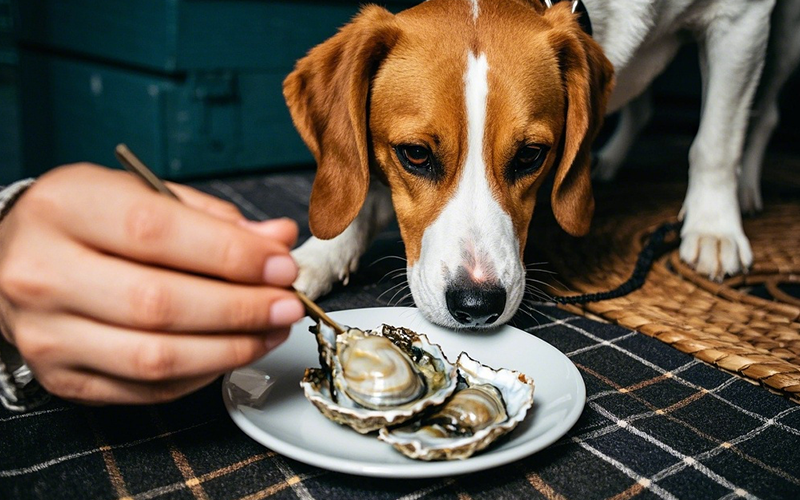Can Dogs Eat Oysters? The Truth About Oysters and Your Dog's Health
- 28 Mar 2025 15:17
As pet parents, we’re always curious about what we can safely share with our dogs from our meals. 🐾 One common food that might cross your mind is oysters. These tasty shellfish are a popular delicacy, but can dogs eat oysters safely? Let’s explore whether oysters are a good choice for your dog’s diet and what to keep in mind.

1. Are Oysters Safe for Dogs?
The short answer is yes, dogs can eat oysters, but there are some important caveats to keep in mind. Oysters are generally safe for dogs in small amounts and can provide a boost of nutrients. However, they should always be cooked and served in moderation.
Raw oysters, on the other hand, can carry harmful bacteria and parasites that may cause illness in your dog. 🤢 It’s best to cook oysters thoroughly before offering them to your dog to ensure any harmful bacteria are destroyed.
2. Benefits of Oysters for Dogs
Oysters are packed with nutrients that can benefit your dog when fed appropriately. Here are some of the potential benefits:
Rich in Protein: Oysters are a great source of protein, which is essential for your dog’s muscle growth and overall health. 💪
High in Omega-3 Fatty Acids: These healthy fats can help support your dog’s coat, skin, and heart health. 🐶✨
Packed with Vitamins and Minerals: Oysters are rich in zinc, iron, and vitamin B12, which are all important for your dog’s immune system and overall vitality.
3. Risks of Feeding Oysters to Dogs
While oysters have nutritional benefits, they come with some risks. These include:
Allergies: Some dogs may be allergic to shellfish. 🦠 Symptoms of an allergic reaction include itching, swelling, vomiting, and diarrhea. Always watch for signs of a reaction when introducing any new food to your dog’s diet.
High in Sodium: Oysters naturally contain a significant amount of sodium, which could lead to salt poisoning if consumed in large quantities. 🚨 It’s important to feed oysters in moderation and avoid seasoning them with salt or other harmful ingredients.
Choking Hazard: Oysters, like other shellfish, can be a choking hazard, especially if they’re not properly prepared. Make sure the oysters are broken down into small, manageable pieces before offering them to your dog.
4. How to Safely Prepare Oysters for Your Dog
To safely prepare oysters for your dog, follow these steps:
Cook Thoroughly: Always cook oysters thoroughly to kill any harmful bacteria or parasites. Steaming or boiling is a good option.
Avoid Seasonings: Don’t add seasonings like garlic, onions, or butter, as these can be toxic to dogs. Keep it simple and serve oysters plain. 🦐
Serve in Small Amounts: Moderation is key. A small amount of oyster as an occasional treat is sufficient to provide health benefits without risking overconsumption.
5. What to Do If Your Dog Eats Raw or Spoiled Oysters
If your dog has eaten raw or spoiled oysters, it’s important to monitor them closely for signs of illness. Symptoms such as vomiting, diarrhea, lethargy, or a lack of appetite may indicate food poisoning. ⏰ In such cases, contact a pet health professional for guidance.
For quick help and peace of mind, PettureX, a friendly pet AI assistant, offers 24-hour online consultations and pet image recognition to help you assess your dog’s health situation. With PettureX, you can get the advice you need, anytime!
6. Can Oysters Be Part of Your Dog’s Regular Diet?
Oysters should be considered an occasional treat rather than a regular part of your dog’s diet. 🐾 A balanced diet of high-quality dog food is essential to ensure your dog gets all the nutrients they need for optimal health. Oysters can be a nice supplement, but they should never replace the core components of your dog’s meals.
7. Signs Your Dog May Have an Allergy or Adverse Reaction
If your dog has an allergy or reacts negatively to oysters, you may notice:
Itchy skin or hives 🐾
Swelling around the face or lips
Vomiting or diarrhea 🤮
Lethargy or weakness
If any of these symptoms occur after feeding your dog oysters, contact a pet health service like PettureX for an immediate consultation.
8. Final Thoughts: Can Dogs Eat Oysters?
In conclusion, dogs can eat oysters cooked in moderation, and they can even enjoy some nutritional benefits from them. 🐶 However, raw oysters should be avoided due to the risk of harmful bacteria and parasites. Always ensure the oysters are thoroughly cooked, served without seasoning, and given in small amounts to prevent any negative reactions.
For any concerns regarding your dog’s health after consuming oysters or any other food, PettureX is here to help! With 24-hour online consultations and the ability to assess your dog’s health via its pet image recognition feature, PettureX is the perfect assistant for any pet-related questions or issues.
Keep your furry friend safe, healthy, and happy by feeding them a balanced diet and introducing new foods carefully! 🌟
Related

Why is Regular Dog Grooming So Important?
- 21 Jun 2025
Can Dogs Eat Kiwis? A Vet-Approved Guide to This Fuzzy Fruit
- 10 Jun 2025
Can Dogs Eat Curry? Unpacking Risks, Benefits, and Safe Alternatives for Your Canine Companion
- 3 Jun 2025
Can Dogs Eat Cooked Carrots? A Crunchy & Colorful Canine Query!
- 29 May 2025
Can Dogs Eat Cooked Cabbage? Unveiling the Crunchy Truth for Your Canine!
- 29 May 2025
Can Dogs Eat Citrus? Peeling Back the Zesty Truth for Your Pup!
- 28 May 2025
Can Dogs Eat Cinnamon Applesauce (A Little Bit)? The Sweet and Spicy Truth!
- 28 May 2025
Can Dogs Eat Chorizo? Sizzling a Warning for Your Furry Friend!
- 27 May 2025
Can Dogs Eat Chili? A Spicy Topic for Canine Consumption!
- 27 May 2025
Can Dogs Eat Raw Chicken? Unveiling the Risks and Realities
- 26 May 2025
